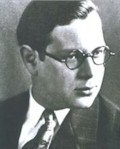
Cantor Alberto Mizrahi, Tenor
National Opera Orchestra
Joseph Ness, Conductor
ABRAHAM ELLSTEIN (1907-1963): V’LIRUSHALAYIM IRCHA
Return in mercy to Jerusalem, Your city,
and dwell therein, as You have promised...
Speedily establish within it the Throne of David...
Blessed are You, O God, Rebuilder of Jerusalem.
The Daily Amidah
Among the major names associated with the heyday of the American Yiddish Theater as songwriters, composers, orchestrators, and conductors, Abraham Ellstein was the only one born in America. He is generally considered one of the big four of Second Avenue, along with Sholom Secunda, Joseph Rumshinsky, and Alexander Olshanetsky. Ellstein, though he may be remembered most widely for some of his theatrical hit songs, went further than the others in the classical realm, and he considered his theater career only part of his overall artistic contribution. Ellstein was born on New York’s Lower East Side—one of the most concentrated eastern European Jewish immigrant areas—and as a boy chorister in local synagogues, he sang with some of the most accomplished cantors of the time. He received his early musical training at the Third Street Settlement House, sang in the Metropolitan Opera Children’s Chorus, and began composing while still a young child. He is said to have written a short opera at the age of eight. At only thirteen he conducted a boy choir in John Barrymore’s Broadway production of Richard III. Ellstein was later awarded a scholarship to The Juilliard School. He studied with Frederick Jacobi, Reuben Goldmark, and Albert Stoessel. Ellstein wrote new music for Molly Picon’s performances of Goldfaden’s Shmendrik, and for the operetta that once played on Second Avenue, Oy iz dos a meydl [O, What a Girl!]. His Hassidic musical revue was performed in Argentina. Active for many years in Yiddish radio, Ellstein had regular programs on WEVD, where he presented a variety of Yiddish folk as well as theater music and cantorial selections. He directed a weekly broadcast of liturgical music, The Song of the Synagogue, and he also wrote and arranged for Broadway, general radio and television, as well as pop concerts and even some British and American film shorts. He was in great demand as a pianist, arranger, and conductor for cantorial concerts and recordings for such great cantors as Yossele Rosenblatt, Leib Glantz, and Mordecai Hershman. His cantorial orchestrations in particular are considered the most stylistically classical in that genre. He conducted synagogue choirs for many years, especially for holy day services, for which he wrote a good deal of traditional cantorial, choral music, most of which remains unpublished, and two modern Sabbath services.